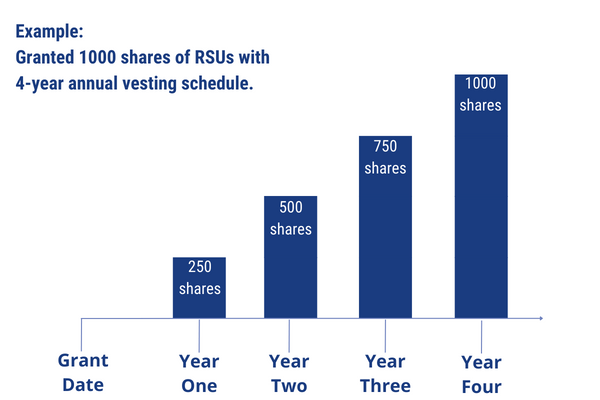How Do RSUs Work?
RSUs can make up a significant portion of your compensation.
When you are granted RSUs, your company sets a vesting schedule. The vesting schedule will tell you the number of shares you will receive and the timeline of when they will vest. Once the shares vest, you can choose to hold or sell the shares.
Here is an example of how RSUs work:
- An employee is granted 1,000 shares of RSUs with a 4-year annual vesting schedule.
- This means that the employee will earn 250 shares each year for 4 years, until they have full ownership of all 1,000 shares.
- On the first vesting date, the employee will own 250 shares of the company’s stock.
- On the second vesting date, the employee will own an additional 250 shares, for a total of 500 shares.
- This process continues until the employee has fully vested in all 1,000 shares.

RSUs and Taxes
RSUs are typically taxed as ordinary income when they vest.
Most companies will withhold a certain portion of the shares to help offset some of the tax owed.
The withholding rate varies company to company, but the standard federal minimum is. If your marginal tax rate is above your company’s default withholding rate, you may find that you owe more when it comes time to file your taxes.
Some companies allow you to adjust your federal withholding rate and increase it from 22% to 37%.
You’ll want to check with your HR department to see what your company allows and what their requirements are when it comes to adjusting your federal withholding rate. If allowed, adjusting your withholding rate could help you avoid an unpleasant surprise at tax time.
What Happens When RSUs Vest?
Typically, we recommend you sell the shares when they vest. With careful planning you can use the proceeds from your RSUs to fund living expenses.
This will allow you to allocate more income from your salary and bonus towards your tax-advantaged employee benefits (401(k), HSA, Mega Backdoor Roth, and Deferred Compensation plans).
This strategy can also help you avoid keeping your money tied up in company stock, which can reduce your concentration risk and help you maintain a diversified portfolio.
If you continue to hold shares after they have vested and sell later, they will be subject to short-term capital gains, long-term capital gains or capital losses depending on the holding period and movement of the stock price.
Do You Have Questions about RSUs?
It is important to understand how RSUs work, including their vesting schedule, tax implications, and potential risks.
With the right strategy, your RSUs can be a valuable tool for building long-term wealth. Reach out to our team if you have questions about what is best for your situation.